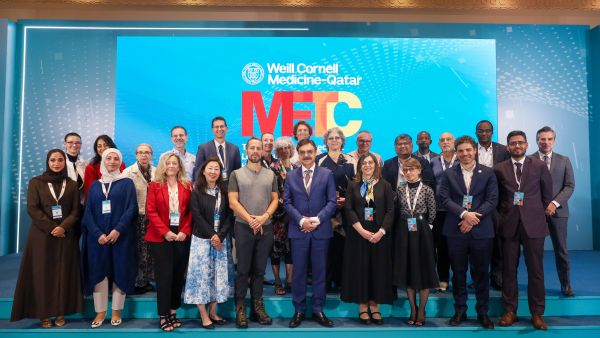WCM-Q conference addresses the impact of AI on medical education

Experts and futurists in medical education and artificial intelligence from all over the world gathered in Doha for a conference organized by Weill Cornell Medicine-Qatar (WCM-Q) which explored how technological breakthroughs are revolutionizing healthcare and the way medicine is taught.
The Medical Education Technology Conference (METC) returned for its second edition, bringing together thought leaders in medical education, technology and the humanities from institutions in Qatar, the US, the UK, and the Netherlands to explore the impact of new advances in artificial intelligence (AI), virtual reality (VR), and augmented reality (AR) on healthcare and education.
The conference, titled “The Power of Connection: Leveraging Technology for Humanistic Medical Education,” addressed the need to integrate study of the humanities with utilization of advanced technologies to ensure medical education remains human-centered, ethical and compassionate. The conference, co-directed by Dr. Thurayya Arayssi, professor of clinical medicine and vice dean for academic and curricular affairs and Dr. Anna Halama, assistant professor of research in physiology and biophysics, also discussed the opportunities and challenges presented by advances in technology which allow medical educators to provide personalized learning and immersive training tools for students and healthcare practitioners.
Dr. Arayssi said: “New technologies, particularly AI and immersive learning, offer us incredibly powerful teaching tools that have the potential to make medical education radically more effective. However, it is incumbent upon us to ensure that these disruptive technologies are deployed in ways which enable medical education programs to continue to cultivate empathy, compassion and creativity in future physicians. We designed METC to provide a forum to discuss these most pressing and important issues facing medical education.”
The conference featured a series of presentations by expert speakers, Q&A panel discussions, and multiple opportunities for attendees to gain hands-on interactive experiences with technologies such as immersive content creation and VR simulations. Presentations discussed the impact of AI on the cognitive development of students and physicians, the emotional and psychological effects of immersive technologies used for medical simulation-based teaching, and the potential benefits of ‘gamification’ teaching methods. Other topics included using AI to enhance rather than compromise empathetic care-giving, the effects of new technologies of human attention, how to retain human influence in AI-assisted medical education research, whether it is ethical for AI to answer physicians’ inbox messages, using virtual simulation training to bridge surgical skills in developing countries, and integrating AI, AR and high-fidelity simulation to enhance skills competence in undergraduate medical training.
The expert speakers at the conference were drawn from elite international medical and educational institutions, including Weill Cornell Medicine in New York; Cornell University in Ithaca, New York; the University of Cambridge, UK; Kenyon College, Ohio; UCI School of Medicine, California; Southern Illinois University School of Medicine; Amsterdam University Medical Center; and Princeton University, New Jersey. The event drew participants from all over the world, with healthcare professionals, educators and students in attendance from Qatar, the wider MENA region, the US, Europe, India and elsewhere. Workshops at the conference demonstrated the use of AI-generated patients in empathy training in medical education, design thinking for inclusive innovation in healthcare technologies, the concept of durational attention, AI agents and workplace innovation, and the use of mixed reality models in medical simulation teaching approaches.
Dr. Javaid Sheikh, Dean of WCM-Q, who gave the welcoming remarks at the conference, said: “This excellent event underlined that the judicious integration of AI and technological advances into medical education has the potential to enhance the acquisition of skills, knowledge and professionalism, which can all help improve patient care. At WCM-Q we believe in embracing innovation to improve healthcare education, while also working hard to maintain the humanistic values of compassion, care, and empathy that form the core principles of responsible physicianship.”
Background Information
Weill Cornell Medical College in Qatar
Weill Cornell Medicine - Qatar is a partnership between Cornell University and Qatar Foundation. It offers a comprehensive six-year medical program leading to the Cornell University M.D. degree with teaching by Cornell and Weill Cornell faculty and by physicians at Hamad Medical Corporation (HMC), Aspetar Orthopedic and Sports Medicine Hospital, the Primary Health Care Corporation, the Feto Maternal Center, and Sidra Medicine, who hold Weill Cornell appointments. Through its biomedical research program, WCM-Q is building a sustainable research community in Qatar while advancing basic science and clinical research. Through its medical college, WCM-Q seeks to provide the finest education possible for medical students, to improve health care both now and for future generations, and to provide high quality health care to the Qatari population.






